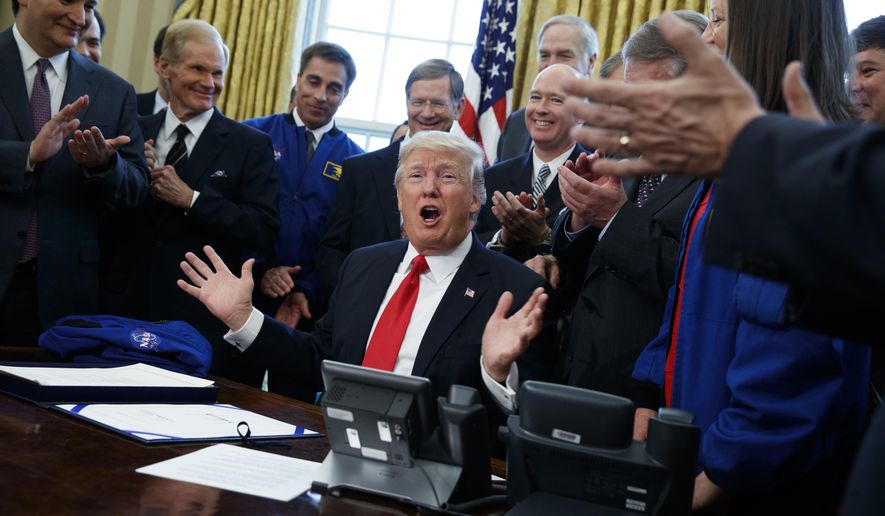President Trump put NASA on course for a mission to Mars and beyond Tuesday, signing a bill that authorized boosting the agency’s current year budget to $19.5 billion and restoring its focus on manned space flights.
Mr. Trump spoke in historic terms about the renewed charge of the National Aeronautics and Space Administration, which was expanded to include “the search for life’s origins, evolution, distribution, and future in the universe” in at the agency’s mission statement.
“Almost half a century ago our brave astronauts first planted the American flag on the moon. That was a big moment in our history. Now this nation is ready to be the first in space once again,” he said at a signing ceremony in the Oval Office.
“Today we are taking the initial steps toward a bold and bright new future of American space flight,” said the president, who was surrounded by several NASA astronauts and a group of lawmakers from both sides of the aisle.
Congress has not passed a NASA authorization bill in nearly seven years. The agency hasn’t had its own spacecraft since retiring the space shuttle program shortly after Endeavour flew its last mission June 1, 2011.
President Obama pulled the plug on NASA’s manned space flights and refocused the agency’s research and development on robotics, saying it saved money. His vision of the space program put an emphasis on private-sector and commercial space industries, with long-term plans for a manned mission to Mars.
At the time, the move was decried by astronauts Neil Armstrong, the first man to walk on the moon, Eugene Cernan, the last man to walk on the moon, and James Lovell, who commanded the heroic Apollo 13 flight. They penned a letter warning that the U.S. was becoming a “second or even third-rate” spacefaring nation.
The Mars expedition still isn’t anytime soon. NASA plans aim to launch the mission in 2033.
But the bill requires NASA to submit a “human exploration roadmap [to] expand human presence b beyond low Earth orbit to the surface of Mars and beyond,” referring to deep space exploration.
“It’s been a long time since a bill like this has been signed, reaffirming our national commitment to the core mission of NASA: Human space exploration, space science and technology,” said Mr. Trump.
He added that the boost for NASA also will create jobs in the space industry.
The bill set goals for manned missions, development of the Orion spacecraft for deep space exploration and partnerships with private spacecraft companies. It also called for advancements in space science, technology and aeronautics programs, including health monitoring and treatment of astronauts’ duty-related medical conditions.
Mr. Trump wanted to continue working with the private secret, setting up joint operations at NASA launch facilities.
“The commercial and the private sector are going to be using these facilities and I hope they are going to be paying us a lot of money,” he said.
Former House Speaker Newt Gingrich, whose proposal for moon bases during his unsuccessful 2012 presidential run was widely mocked, said it was a “step in the right direction.”
The fast-moving advancements are being driven by private investments from billionaires such as Elon Musk with SpaceX, Jeff Bezos with Blue Origin and Richard Branson with Virgin Galactic, he said.
“You are right at the edge of a generator of extraordinary exploration,” said Mr. Gingrich, who previously served as a Trump campaign adviser.
The revamp of NASA fulfills one of Mr. Trump’s promises from the campaign, including promising more manned space flights, more partnerships with private companies and more space industry jobs.
“Under a Trump Administration, Florida and America will lead the way into the stars,” he said at an October rally in Sanford, Florida.
The legislation enjoyed bipartisan support in Congress. However, the new vision for NASA faced criticism from advocates for fighting climate change because it reduces the agencies earth science programs.
The measures supporters argued that other agencies collect climate change data and will continue to do so.
At the signing ceremony, Mr. Trump praised the astronauts and joked with the assembled lawmakers about the perils of space travel.
“It’s a pretty tough job,” he said, turning to Sen. Ted Cruz of Texas, a co-sponsor of the bill. “I don’t know Ted would you like to do it? I don’t think I would.”
He then made the same offer to Sen. Marco Rubio of Florida, another co-sponsor standing beside the Resolute Desk.
“I’m not sure we want to do it,” Mr. Trump said.
Mr. Cruz piped in: “You could send Congress to space.”
The lawmakers and astronauts laughed and Mr. Trump said, “We could. What a great idea that could be.”
• S.A. Miller can be reached at smiller@washingtontimes.com.




Please read our comment policy before commenting.